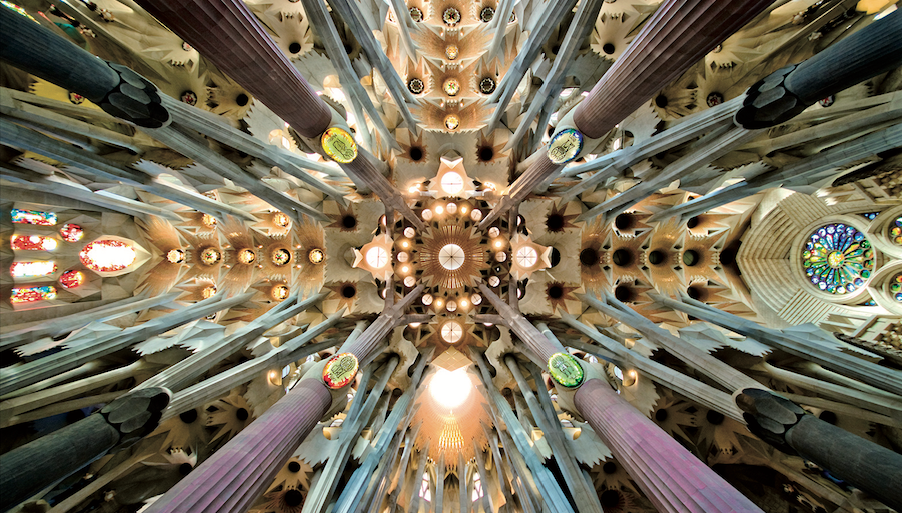2018: The year of Plastics Schizophrenia
The psychiatrist Thomas Szasz writes: «The proverb suggests that we don’t bite the hand that feeds us. But perhaps we ought to, if that hand actually prevents us from feeding ourselves».
Editorial by Stefano Lavorini.
Barcelona, 11 and 12 October, the Giflex autumn congress. Sitting in the hall I attentively listen to the detailed talks on European strategy for plastics, marine littering, corporate responsibility.
All the same, despite the rigour of the analyses and the projects fielded, I feel ill at ease, thinking about what, as if in a parallel universe, is happening in the world.

Photo Wikipedia. Barcellona, Sagrada Familia, nave roof detail
Roberto Guala, president of Giflex,, announces that the flexible packaging market continues to grow globally at a rate of 4% (and should go from 86 to 107 billion dollars in 2022), with Italy keeping up with the rest of Europe (+ 2%) thanks to 55% of exports. He underlines that the EU Plastics Strategy represents an opportunity to understand what the industry can actually do to help improve the world, first and foremost by focusing on the goal of making flexible packaging recyclable.
And he does not fail to stress, with courage, how no one can declare they are unaware of the problem; indeed, being active in the coming transformation is fully part of the association's program.
«Are we flexible? It's time to prove it», he concludes.
Clear and encouraging words that, however basically seem to me to clash with phenomena of incomparable scope such as the Chinese expansion in the world, that soft neo-colonialism of the Celestial Empire that, with the "debt trap", is buying up Africa, most of the countries that participate in the "Belt and Road" infrastructure investment plan and not only that (see 20% of US debt), with the aim of imposing a new global economic government in place of the American one.
| *"I’ll tell you what game we are playing", Michele Serra interviews Alessandro Baricco, Il Venerdi 28/9/2018 |
I meditate on the words of Clodia Vurro, University of Milan, who, with a view to corporate sustainability, aims to make entrepreneurs discover the legacy of intangible assets they naturally possess, in terms of human capital, innovation and knowledge, culture and reputation. Corporate sustainability is a must that cannot be deferred beyond a certain point, if we want to respond to the demands of an increasingly aware consumer.
Though I have a niggling doubt ... Are we talking about those people who, only if well informed, are less inclined to follow false myths, to not slip towards extremism and intolerance; or, rather, are we talking about those people who, prosaically appear evermore merely consumers of controlled information?
We are in the age of speed and superficiality, so that to stay with our feet on the ground, we can only ask ourselves "what kind of humanity has Google - already by now - created and why has it done so?" *.
Bernard Merky, founder of Waste Free Oceans, tells us of possible solutions to marine littering while Serena Carpentieri clarifies the position of Legambiente on the European Plastics Strategy: both agree that plastic waste is a precious resource that has ended up in the wrong place. That of putting the value of plastics back at the centre is a huge problem to be faced, which requires a joint effort by governments, industry and civil society, going the way of ever deeper involvement, innovation, all with a view to sustainability.
Propositions and resolutions reaffirmed during the round table, which also included Renato Zelcher as president of EuPC: waste in the oceans is a transnational problem, and although the global political context is heading towards sovereignism and localism, this cannot be an excuse for not doing what we can and ought to do.
How can we not agree? Who can help remember that, after 2008, after the worries of the crisis, after the first years in which the very same economic system had been called into question, people returned to acting exactly as they did before, as if nothing had happened? Today, the American stock market is creaking again and despite the double-digit growth in profits for major US institutions, JP Morgan warns, in no uncertain terms, that the "situation is explosive".
Not even the intriguing and captivating talk given by Vincenzo Russo (IULM University) on neuroscience at the service of marketing, which reminds onlookers how, in the decision-making process, in essence "we are predictably irrational", manages to completely distract me from my reflections.
Perhaps the thing that in the end escapes me, which seems to me to be lacking in the speeches I listen to - and certainly not the fault of those present or the organizers - is an ideological framework in which to place the single aspects in which reality is broken down into. Without government, without a directive orientation of politics, thoughts, projects seem to be at the mercy of the arbitrariness of psychotic mental mechanisms (read: schizophrenia).
I know that the truth is unattractive and that every reference to the "complexity of problems" is immediately accused of defeatism. It is more comforting to think that someone (But who? and how?) can offer us an easy solution to problems of planetary scope, rather than working to bring the many themes back to a principle of reality, with a long-term perspective without being limited down to the present.
Long is the road, narrow the way ...















